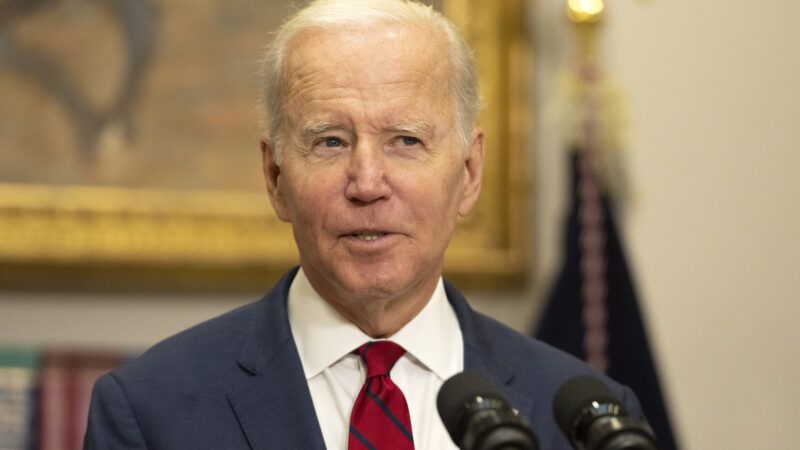No, the HEROES Act Doesn't Let Biden Forgive Student Loans
"If it was an emergency, why wait three years to provide the forgiveness? Why present it in a political framework, as fulfilling a campaign promise?" said one higher education expert.

Next week, the Supreme Court is set to begin hearing arguments in two cases that could decide the fate of President Joe Biden's plan to forgive a half-trillion dollars in federal student loans. While his plan has already been defeated in federal court several times, sympathetic media stories have insisted that Biden's plan is perfectly legal—and credulously repeated the administration's claim about the 2003 legislation used to justify the plan.
In August, Biden announced that the government would be forgiving $10,000 in federal student loans for borrowers earning under $125,000 annually and couples making less than $250,000. For Pell Grant recipients, the maximum forgiveness amount would rise to $20,000. Biden also announced substantial changes to already-existing loan forgiveness programs. In all, the Committee for a Responsible Federal Budget estimated that the program could cost taxpayers between $500 and $650 billion.
Biden has justified spending such an incredible amount without first obtaining congressional approval by invoking the HEROES Act, a 9/11-era law designed to allow the federal government to provide student debt relief to soldiers who were forced to withdraw from college to enter active duty. Under the HEROES Act, the Secretary of Education is granted the authority to waive "any statutory or regulatory provision" relating to student loan repayment or assistance programs during a time of "a war or other military operation or national emergency."
Biden and his supporters argue that the COVID-19 national emergency, which began in March 2020 and is still technically ongoing, falls under that characterization, thus rendering Biden's plan perfectly legal.
"Given the text of the Heroes Act," wrote Vox journalist Ian Millhiser, "it is hard to even conceive of an argument rooted in the text of federal law that undercuts Biden's loan forgiveness program."
"There's no question that the covid-19 pandemic is a 'national emergency' within the meaning of the law," wrote George Miller, a former congressman who co-sponsored the HEROES Act in 2003. "The law specifically states that a 'national emergency' includes any event declared by the president to be a national emergency."
However, these writers seem to credulously adopt the idea that the continued COVID-19 "national emergency" designation is appropriate—especially when considering that the original law was designed to protect soldiers going off to war.
Biden himself, just weeks after announcing his student loan forgiveness plan, conceded that the COVID emergency was effectively over, saying "The pandemic is over. We still have a problem with COVID. We're still doing a lot of work on it. But the pandemic is over."
As Reason's Peter Suderman wrote in September, "If the pandemic is over, then there is no ongoing national emergency, which means that the already shaky legal ground on which the Biden administration based its action has now collapsed entirely."
And there are more reasons to think that the HEROES Act does not allow for unprecedented government spending under this flimsiest of "national emergencies." Even some of Biden's closest allies have conceded that such a dramatic use of taxpayer money requires congressional approval.
"The president can't do it—so that's not even a discussion," then-Speaker of the House Nancy Pelosi said during a June 2021 press conference. "Not everybody realizes that, but the president can only postpone, delay but not forgive student loans. It would take an act of Congress, not an executive order, to cancel student loan debt."
Some have also argued that the HEROES Act itself simply doesn't contain sufficiently explicit support for Biden's policy, which would be well beyond its intended scope. "A policy as consequential and controversial as a $400 billion debt-forgiveness plan must be supported by a clear statement in the statutory text," wrote Thomas A. Berry, a research fellow at the Cato Institute, wrote earlier this month. "Because the HEROES Act does not come close to meeting that standard, the Supreme Court should invalidate the plan."
The legal ground justifying Biden's student loan relief plan has always been shaky—and obviously politically motivated. As higher education expert Mark Kantrowitz told CNBC earlier this month, "If it was an emergency, why wait three years to provide the forgiveness? Why present it in a political framework, as fulfilling a campaign promise?"
Even though the COVID emergency has clearly long been over—and attempts to extend it are simply overreaches of executive power, that hasn't stopped sympathetic media outlets from suggesting that a federal law designed to protect soldiers at war can extend to millions of Americans months after the president himself admitted the pandemic is over.
However, despite a lack of skeptical coverage, the Court—which is widely expected to strike down the forgiveness plan—is unlikely to fall for the same blunders.


Show Comments (86)